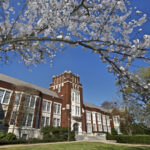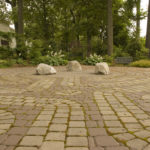Creating a Sacred Place for mental health

Jacksonville State University (JSU), located in Jacksonville, Alabama, is a public institution with a strong focus on supporting its students’ well-being. Following the devastation caused by a tornado in 2019, JSU began to explore ways to not only rebuild its campus but also create spaces that foster mental health and well-being for its students. The university, which serves a diverse student population, sees the Sacred Place project as a critical addition to its support of student wellness.
In a nutshell
Location: Jacksonville, Alabama The need for mental health spaces Purpose: Create a quiet, contemplative space for reflection, mindfulness workshops, and mental health programming Funding and partnerships Grant Provider: Community Foundation of Northeast Alabama Student engagement in design Key Advocate: Grace Ann Lundy, Miss JSU, raised over $13,000 for the project Design features Key Elements: Circular pathways, pergola, hammock poles, Nature Sacred benches, student-designed sculpture Educational and Mental Health Impact Programs Enhanced: Mindfulness Mondays, relaxation exercises, structured workshops |
The Need
The need for a mental health-focused space became apparent after the 2019 tornado, which destroyed much of the campus’s tree canopy. The JSU Counseling Services team, led by former staff member Julie Nix, saw the opportunity to create a designated space where students could decompress, reflect, and calm their minds. This need became more pressing as JSU continued to experience rising rates of student stress and anxiety. The goal was to create a quiet, contemplative environment where students could retreat for personal reflection, or participate in small group mindfulness workshops and other mental health programs.
The Solution
JSU applied for and was selected for a grant through the Community Foundation of Northeast Alabama, which enabled the university to design a Sacred Place on campus. The project has been a collaborative effort, engaging not only the Counseling Services but also the art department, the JSU community, and student leaders like Grace Ann Lundy, Miss JSU, who used her platform to personally raise more than $13,000 during Mental Health Awareness Month. The university has raised more than $60,000, in addition to other separate grant funding, for construction.
Students, faculty, and staff provided input on the key elements of the space, ensuring that it is more than a place of beauty, but also a place that supports the wellbeing of students and faculty. In addition to functioning as a retreat for quiet reflection, the space was designed to be used for structured activities like “Mindfulness Mondays,” led by counseling staff.
Design features and community engagement
The Sacred Place at JSU includes several design elements that foster both individual reflection and community interaction:
Pathways: Circular paths surrounding the space for ease of movement and accessibility.
Pergola and archways: A focal point with shade, providing a calm and welcoming environment.
Hammock poles: A unique feature where students can hang hammocks, a popular activity on campus.
Nature Sacred benches: Two benches to encourage quiet reflection.
Sculpture: A collaboration with the JSU art department will result in the creation of a student-designed sculpture, adding a creative dimension to the space.
The art department, led by Associate Dean Seth Johnson, will oversee a unique student sculpture project that will culminate in the installation of collectively envisioned and produced piece of sculpture art that will be placed inside the Sacred Place.
Educational and mental health impact
JSU’s Sacred Place is not only a mental health resource but also a hub for interactive learning. In addition to informal use, the university’s counseling services plan to use the space for mindfulness workshops and relaxation exercises. The space will serve as a natural extension of the mental health programs offered on campus, allowing students to participate in group sessions and individual activities in a serene, nature-based setting.
By integrating this Sacred Place into both student life and mental health programming, JSU aims to create a lasting, positive impact on its student body. The space will also be part of the larger. The Nature Sacred Network includes a growing number of Sacred Places on university campuses, such as Talladega College, the University of Maryland, the University of Maryland Baltimore Campus, and Penn State, ensuring ongoing support and connection to a broader community of Sacred Places across the country.




